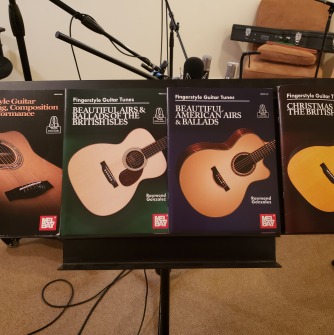| Contact |
Center for Research and Creative Activities
|
|---|
Professor Raymond Gonzalez from Salem State’s Music and Dance department is continuously broadening his musical palate to better the learning experiences of his students. In addition to being a professor, Gonzalez is a “composer, arranger, producer, and multi-instrumentalist" who creates both independent and contracted work. Most recently, Gonzalez has been working with international publishing house Mel Bay Publications to arrange a series of eight books for the fingerstyle guitarist.
In December 2022, Professor Gonzalez published Christmas in the British Isles, a collection of twenty guitar arrangements of both familiar and lesser-known traditional Celtic holiday songs. The volume of compositions is the fourth book in Gonzalez’s eight-volume series that includes Arranging, Composition and Performance; Beautiful Airs & Ballads of the British Isles; and Beautiful American Airs & Ballads (available to international audiences in both hardcopy and eBook form through Mel Bay). Gonzalez notes the next publication will feature early American Christmas songs, which will be released by the end of this year.
While there is no single theme that unifies the collection of song books, Professor Gonzalez notes that the pieces included in each volume are chosen by the publishing house and range from the renaissance period to traditional songs of the early 20th century. These pieces are traditionally composed for voice, violin, reed or wind instruments as well as early guitars and lute; however, in Gonzalez’s work, he arranges the compositions for fingerstyle guitarists in standard and dropped-D tunings, which makes them more accessible to steel- and nylon-string guitarists of both intermediate and advanced skill levels. The resulting books, according to Mel Bay, highlight Gonzalez’s “gift for combining traditional harmonies with occasional harmonic and rhythmic twists, providing freshness, color, and new life to familiar tunes.”
In addition to fulfilling numerous commissions and consistently working on new compositions, Gonzalez has also published 12 full-length CD’s. Five for solo fingerstyle guitar, six of original songs and one of seasonal holiday music mainly from the Renaissance and Middle Ages.
When reflecting on his passion for music, Professor Gonzalez says his interest in musical composition began at a young age, when he often drew creative inspiration from nature. From writing symphonies, chamber music and solo works by hand, Gonzalez says it’s incredible to now have access to technology that allows him to compose symphonies from his own home on the North Shore (an environment that Gonzalez says continues to inspire him). As an artist, Gonzalez enjoys creating works that incorporate different styles of music from modern classical to jazz and Celtic influences. Composing these eclectic works, Gonzalez notes, is an evolution, and the composer never arrives at a destination because there’s always more to explore.
Professor Gonzalez’s diverse repertoire of music industry experience allows him to approach his teaching from a number of angles. For example, in Gonzalez’s songwriting course, students begin the semester with a general awareness and comfort in their songwriting style. Gonzalez, however, regularly encourages these students to leave their comfort zones and explore a variety of styles to diversify their palates. In challenging them to do so, Gonzalez underscores the importance of participating in different experiences to develop one’s musical style. This development, Gonzalez says, happens cooperatively, too: in workshops, students receive feedback from their peers, allowing them to build connections as a community of songwriters. At the end of the semester, Gonzalez reflects on how remarkable it is to see students finish the course with a handful of their own songs.
As both a musician and teacher, Professor Gonzalez understands the importance of prioritizing the arts as a means of social and creative expression. It is often easy to get bogged down with our social environment, Gonzalez says, and finding an outlet to express ourselves through the arts is one of the best things we can do, especially when we need to connect with each other. For Gonzalez, when the COVID-19 pandemic led to the shutdown of public performing spaces, this critical mode of connection was drastically altered, limiting him and other musicians to their homes. As Gonzalez and his colleagues begin to rejoin communal performance spaces, creative connections are also returning—something Gonzalez is looking forward to engaging in again.
Congratulations on your publications, Professor Gonzalez!
-------
Do you want to share your research and creative activities with the SSU community? Contact the CRCA at ssu-crca@salemstate.edu and tell us what you’ve been up to!

